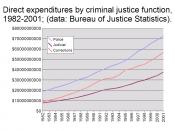Sentencing is seen as an important aspect of the criminal justice system and has been used as a way of dealing with offenders since the founding of the law system as we know it. It is not a simple process however, as many considerations must be taken into account before an appropriate sentence can be imposed. For example, should the main aim of sentencing to be to protect the public from the offender or purely to punish or rehabilitate the individual committing the offence? Furthermore, does punishment of this sort actually help to reduce crime and can the CJS realistically achieve all that it sets out to?
The aim is to look at the specific factors that influence the sentencing process in England and Wales. Considered will be social factors such as level of responsibility and school record and personal characteristics, for example, age, sex and race. Each factor will then be critically assessed to ascertain whether or not the delinquent and the general public are being treated fairly.
There are a great number of factors that influence sentencing in England and Wales. First and foremost the magistrate examines the seriousness of the offence in relation to other crimes. Therefore, a crime such as murder would require a much harsher punishment than for shoplifting due to the fact that it has obvious victims and acting in a lenient manner would cause uproar. It must also be determined whether or not the misdemeanour had any mitigating or aggravating factors. An aggravating factor is where the crime committed took place against a vulnerable individual or group, such as the elderly. In addition, any offence that was planned or involved any sort of weapon could be seen as aggravation along with any previous convictions that the defendant may hold (Flood-Page & Mackie,


